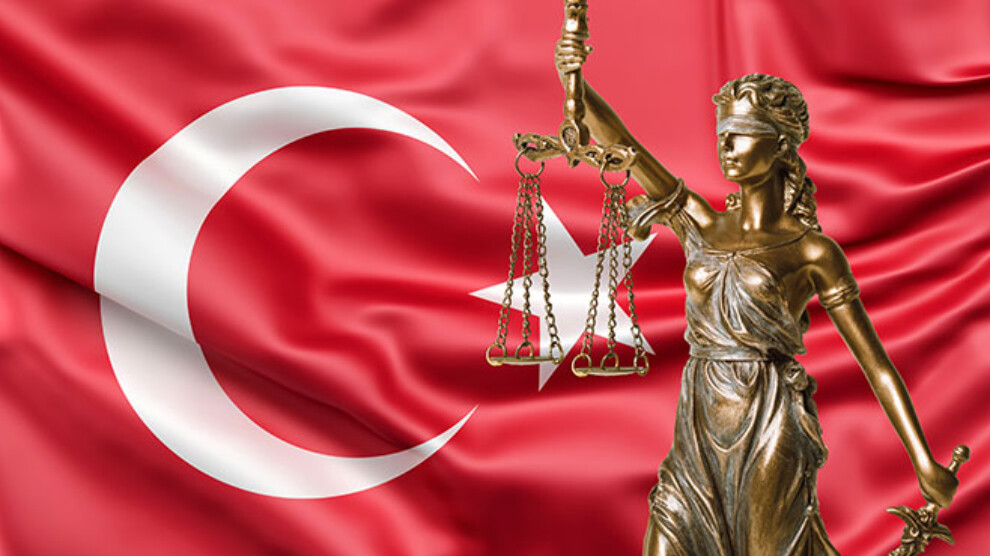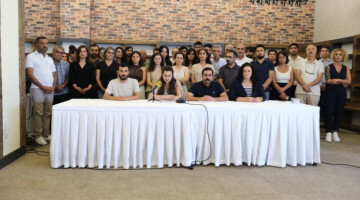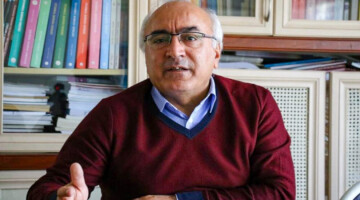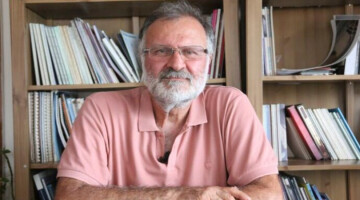In Turkey, criminal prosecution is also used to punish political action that is unpopular with the government. This is one of the findings of the comprehensive scientific report commissioned by PRO ASYL. The Federal Office for Migration and Refugees must also recognise this reality and change its decision-making practice, the organization demands.
Does the Turkish judiciary follow the rule of law in criminal proceedings with political implications? This question is often at the centre of asylum proceedings involving Turkish citizens.
In order to get an answer, PRO ASYL has commissioned an expert legal opinion. It addresses the state of Turkish criminal justice with regard to its independence, impartiality and respect for procedural rights, particularly with regard to proceedings involving terrorism charges. The investigation is based on the evaluation of, among other things, judgments of the European Court of Human Rights, reports of the Council of Europe and the European Commission, judgments of Turkish courts, and interviews with lawyers practising in Turkey.
Highlights from the PRO ASYL report released on Thursday include the following:
‘Propaganda for a terrorist organisation’, “membership of a terrorist organisation”, “support for a terrorist organisation” – asylum seekers from Turkey are all too familiar with these criminal offences. Many have fled to Germany precisely to escape these or similar, mostly unfounded accusations, as well as the years of investigation and impending punishment. For years, Turkey has been one of the main countries of origin for people seeking protection in Germany.
The fact that the accusations of having committed crimes in the area of ‘terrorism’ in Turkey are mostly fabricated accusations that are arbitrarily raised in Turkey is now documented in the 140-page report commissioned by PRO ASYL ‘On the state of the judiciary in Turkey. Legal uncertainty in politically motivated criminal proceedings. It shows that criminal proceedings based on terrorism-related accusations regularly undermine the criteria of the rule of law. The people concerned have no opportunity to defend themselves effectively and cannot expect a fair trial. Judicial independence is not guaranteed.
In this context, various risk groups can be identified that are particularly at risk of becoming the target of political prosecution – for example, those who express themselves ‘too politically’ on topics considered too sensitive, such as the concerns of Kurds, corruption or human rights violations by Turkey. Within this group, members of the Kurdish population as a whole are at a higher risk than other groups of being confronted with politically motivated prosecution.
The problem is that the Federal Office for Migration and Refugees (BAMF) often fails to recognise these circumstances and denies the necessary protection. The new report is therefore an important source of information that should also lead to a change in the BAMF's recognition practice.
Detailed analysis of the Turkish criminal justice system with regard to political proceedings
The findings in the report are based on an analysis of the state of the Turkish criminal justice system over a period of more than a year, with a view to its independence, impartiality and respect for procedural rights, particularly in relation to proceedings involving terrorism charges. The investigation was carried out by two independent, renowned legal scholars, whose identities PRO ASYL is not disclosing for security reasons. This decision alone speaks volumes about the state of the Turkish rule of law.
The authors have evaluated rulings by Turkish courts and the European Court of Human Rights, analysed reports by the Council of Europe and the European Commission, among others, and interviewed lawyers practising in various parts of Turkey. Their investigation is divided into four parts, each dedicated to a specific problem area: the judicial system, terrorism-related offences and their application, the collection and evaluation of evidence, and the safeguarding of the criteria for the right to a fair trial.
The independence of the Turkish judicial system is suspended
The identified weaknesses in the Turkish judicial system are due to various factors. For example, the far-reaching restructuring in the composition of the courts and the filling of key positions in the structures of the judiciary have led to abuses. In particular, in 2016 and especially in the area of criminal justice, a large number of judges and public prosecutors were newly appointed in a highly non-transparent process. Central posts have come under political influence and are effectively filled by the ruling party.
It is highly unlikely that these judges or public prosecutors will make decisions that are unpopular with the government. If they do, they face disciplinary action, transfer or dismissal. There are known cases in which public prosecutors and judges have been prosecuted even after making unwanted rulings. On the other hand, pro-government decisions lead to promotions. Accordingly, charges and verdicts are regularly one-sided. Judges and public prosecutors are not free in their decisions. In this structure, it often happens that verdicts of higher courts are ignored.
In 2020, the Council of Europe Commissioner for Human Rights also noted that strategic and political-conjunctural considerations were more significant than legal considerations for court decisions. And even the European Commission expresses strong concerns about political interference in the judiciary in its latest report on Turkey (2023).
Investigations, charges and convictions are subject to arbitrariness
In addition, significant parts of Turkish criminal law and the Turkish anti-terror law are not clearly formulated. The relevant paragraphs are interpreted very freely, with the result that it is impossible to predict which action will be considered a criminal offence and which will not. The sword of Damocles thus hangs over the daily lives of many people in Turkey.
Participation in a public, non-prohibited assembly can be criminalised as soon as an organisation classified as terrorist has called for it – regardless of whether the accused person was even aware of the call by the organisation classified as terrorist. But that's not all: the legal definitions have now been so broadened in their interpretation that it is not even clear on what legal basis a prosecution could follow – ‘membership of’, ‘committing a crime in the name of’ or ‘supporting’ – the boundaries are fluid. The criteria that have been established – albeit still vague – with regard to the question of when ‘membership of a terrorist organisation’ exists, for example, are regularly undermined in established case law. The European Court of Human Rights has already often ruled that this contradicts the requirement of certainty enshrined in the European Convention on Human Rights, but so far this has not changed anything.
These shortcomings in Turkish legislation are exacerbated in their actual implementation. For example, in some criminal cases, it is not possible to determine on the basis of which facts the prosecution is based. In other cases, a so-called statement of facts can be found in the files, but there is then no examination of whether the facts actually constitute a criminal offence.
Faulty collection of evidence
Another element of the crumbling rule of law with regard to politically motivated criminal proceedings is the tendentious nature of the investigations on which charges and convictions are based. As a rule, investigations are only conducted in a direction that is disadvantageous for the person concerned and confirms the initial suspicion. A central element here is testimony from ‘secret’ witnesses. It is not uncommon for such a witness to make statements about many – in some cases hundreds – of people that lead to a conviction. The statements often remain very superficial. It is often not possible to understand how a particular conclusion or assessment by the prosecution is reached on the basis of the statements.
However, it is difficult or even impossible for the defence to counter these incriminating statements. Lawyers do not have a fair chance to question the witnesses or to ask follow-up questions and thus refute the claim. This is just one of many examples that make it clear that the ‘equality of arms’ between prosecution and defence has been suspended. There are even known cases in which the witness themselves retracted the incriminating testimony in court, claiming that it had been extorted under psychological or physical violence, and yet the judgement was based on this very ‘old’ incriminating testimony.
PRO ASYL: BAMF must adapt guiding principles for Turkey!
Thousands of people continue to flee from Turkey to Germany to escape the practices described above and seek asylum in their search for protection from state persecution – in the first half of 2024, the BAMF registered almost 16,000 initial applications from Turkish citizens in Germany. As in previous years, Kurds continue to make up the largest share, and are particularly targeted by the state.
Those who flee from prosecution face years of investigation in Turkey for acts they have not committed. They cannot rely on the right to a fair trial, as enshrined in Article 6 of the European Convention on Human Rights. Instead, they face long prison sentences and thus unlawful deprivation of liberty. The chance of participating in politics is hardly possible under these circumstances. Yet despite the pressure of persecution described above, the overall protection rate in proceedings involving Turkish asylum seekers continues to fall; in the first half of 2024, the adjusted overall protection rate was only 13 percent. Applicants are confronted with the uncritical adoption of Turkish accusations by German authorities and a burden of proof that far exceeds the usual level in asylum proceedings.
The BAMF must face reality and recognise the arbitrariness of Turkish criminal proceedings with a political connection, which has been proven once again by the report. This makes it imperative to adjust the country's guidelines for Turkey, to take the findings into account in training courses and to make appropriate changes to the decision-making practice. The administrative courts should also use the report as an opportunity to review their case law. Victims of persecution in the Turkish criminal justice system need protection!
Title Photo: PRO ASYL














